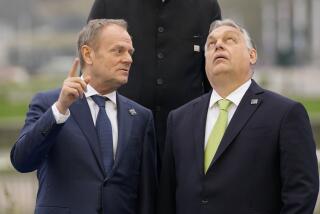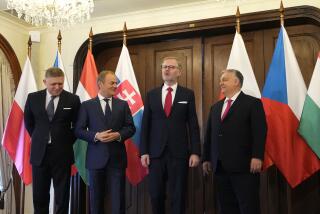REALIGNMENT : E. Europe Ready to Bury Warsaw Pact Despite Moscow’s Efforts to Revive It
- Share via
BUDAPEST, Hungary — Freed from the hated military alliance that snuffed out their earlier bids for freedom, the new democracies of Eastern Europe now seem united only by a common will to break away from the Kremlin.
The Warsaw Pact, as a defense bloc, has been disarmed by a conventional weapons accord and appears destined for dissolution at a summit in Budapest expected early next year.
Soviet President Mikhail S. Gorbachev contends that the remnants of the alliance will be transformed into a political forum for further East-West dialogue and as a counterweight to the North Atlantic Treaty Organization. But the attitude prevailing in most of Eastern Europe is that the Warsaw Pact is a diplomatic dinosaur that cannot be saved from extinction.
“Hungary doesn’t want such a political commission to survive,” said Deputy Foreign Minister David Meiszter, when asked about Soviet efforts to breathe life into the dying bloc. “We want an end to the military and political integration because it is an anachronistic element of the European process.”
Czechoslovak President Vaclav Havel also has made clear that he prefers to see the moribund alliance phased out with all deliberate speed.
“In contrast to NATO, the Warsaw Pact, as all members now recognize, is a vestige of the past,” Havel told the Conference on Security and Cooperation in Europe during its recent Paris summit. “It emerged as a typical product of Stalinist expansionism and was a tool for subordination of Communist countries to the Soviet Union.”
Havel called for complete liquidation of the alliance after a brief period as “a temporary consultative organization oriented entirely to the question of disarmament.”
Hungary already has announced it will pull out of the alliance at the end of next year, by which time the East Bloc’s arms reductions should be completed and verified.
In the meantime, some officials cannot even bring themselves to utter the alliance name.
At a recent meeting of Warsaw Pact foreign ministers, Hungarian, Polish and Romanian delegates pointedly referred to their dwindling association as “the Group of Six.”
The seventh member, East Germany, won coveted inclusion in the European Community and NATO when it merged with West Germany on Oct. 3. The loss of that front-line state to the rival defense bloc has underscored the superfluous nature of the Warsaw Pact in a Europe that is striving to unite.
Disagreement between Moscow and its former satellites over how to put an end to a 35-year relationship is one reason the final summit has proved so elusive.
Gorbachev begged off from the meeting initially set for early November, citing internal Soviet unrest. Continuing domestic crises prompted a second postponement, after Hungarian hosts suggested Dec. 9 for the Warsaw Pact swan song.
While the former allies have been unable to formally negotiate an end to their forced camaraderie, most are already looking elsewhere for political and economic partners.
The Pentagonale group, formed in April, unites Hungary, Czechoslovakia, Yugoslavia, Italy and Austria in trade, transport and environmental cleanup. Membership for Poland has also been discussed as a means of gaining access to the Baltic Sea and Nordic countries.
Poland, Hungary and Czechoslovakia have been discussing a new trade bloc to replace the Comecon network, which falls apart after Jan. 1, when all accounting will be conducted in hard currency.
The three new democracies have made quiet overtures to NATO, reportedly seeking assurances of their security now that Moscow’s military role has been reduced by popular demand.
However, associate-member status has been ruled out as a shift in power that would intimidate the Soviet Union.
Bulgaria and Romania have been noticeably silent in the Warsaw Pact debate over how to close shop. But their reticence has little to do with loyalty to the Soviets, whose political and economic models have drawn them to the edge of disaster.
The poor Balkan cousins have been effectively ostracized because of persistent political strife that has stalled economic recovery.
WHO STILL BELONGS
BACKGROUND: The Warsaw Pact was formed in 1955 by the Soviet Union and its Eastern Europe allies in direct response to measures taken by Western Europe and the United States to bring about the rearmament of West Germany and its inclusion in NATO.
MEMBERS: Soviet Union, Poland, Czechoslovakia, Hungary, Romania, Bulgaria. East Germany and Albania, original signatories, are no longer part of the alliance.
More to Read
Sign up for Essential California
The most important California stories and recommendations in your inbox every morning.
You may occasionally receive promotional content from the Los Angeles Times.











